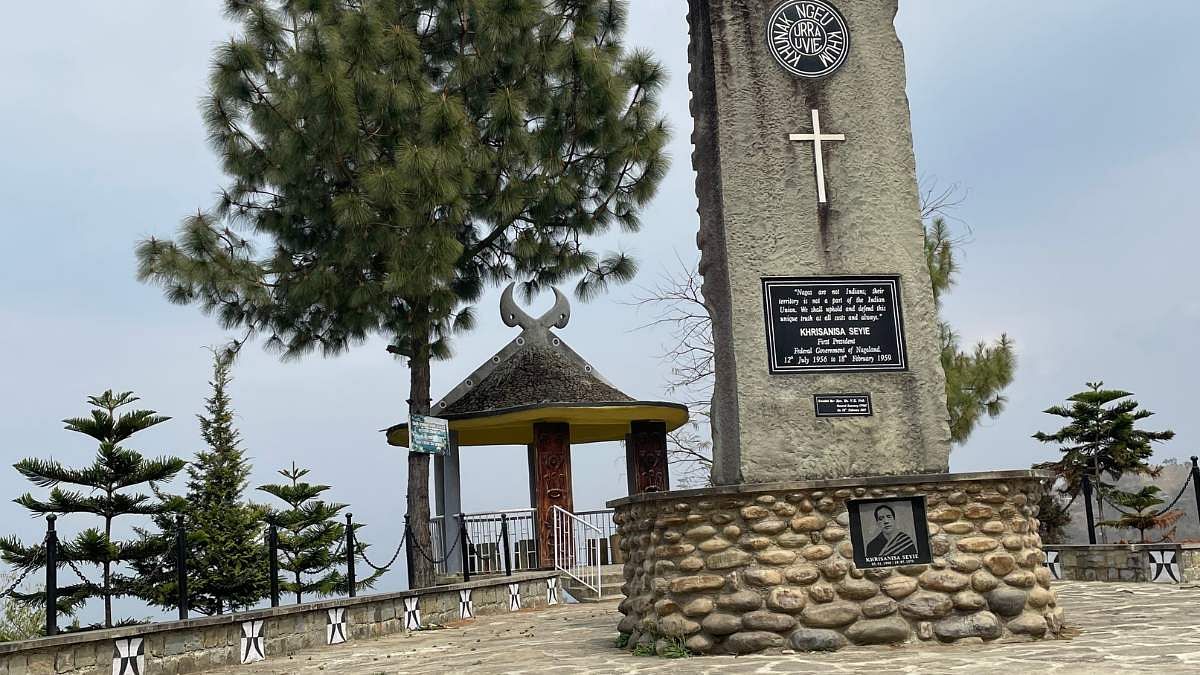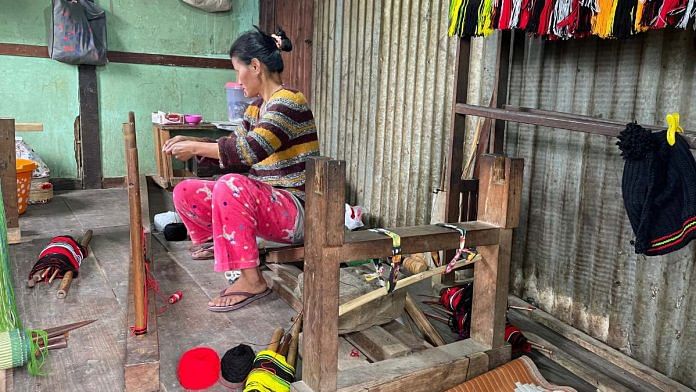Khonoma: The sign says: “Caution! Heavy landslide area, go/travel at your own risk”.
For those not deterred by the warning, Khonoma awaits. Designated as Asia’s first green village, it’s promoted by the government of India as an eco-friendly tourist destination.
But this election season in Nagaland, Khonoma, the site of many Naga-British skirmishes and the seat of many lores, has another distinction. Salhoutuonuo Kruse, a local hotel owner, and one of only four women candidates in the fray, is a ‘daughter of the village’. She is contesting from the Western Angami constituency against Keneizhakho Nakhro, an Independent.
Nakhro is the sitting MLA and among the 21 Naga People’s Front MLAs who joined the Nationalist Democratic Progressive Party (NDPP). He was, however, denied the NDPP ticket. It went to Kruse.
As ThePrint reached Khonoma, the only signs of last campaign day activity were a bunch of young men playing carrom while lunch was being cooked in a big pot on a wood fire some distance away — the scene at the campaign office of Nakhro.
The village is still not used to the concept of women wielding political power. Kevi Phule, a carpenter who also works part-time as a guide, said, “We do have women members in the village council. But honestly speaking, they are just there to cook the meals, or make tea during the meetings as the men folk decide.”
He added: “The independent candidate is the sitting MLA, but this time, the election will be different. Ninety per cent people will vote for the NDPP candidate. We have not sent one of our own to the assembly for long and that needs to change.”
Phule explains that the decisions are made by the village elders along with the heads of the three clans, and everyone needs to comply. As he speaks, his phone rings and he starts speaking in Hindi. He helpfully puts the phone on speaker.
The man on the other side says, “It was good for madam but now it is becoming narrow. Be circumspect.” Phule responds, “Much can change on the last night.” As he disconnects the phone, he makes a gesture with his thumb and forefinger to answer ThePrint’s question about why the odds are narrowing. The gesture means cash. “That was my contact from Delhi,” he says, by way of explanation.

Of the 183 candidates in the fray — one candidate has already been elected unopposed — four are women. This is a dip from the 2018 elections when five of the 196 candidates in the fray were women. The Nagaland assembly has never seen a woman member. Campaigning for Kruse earlier this week, Assam Chief Minister Himanta Biswa Sarma had described the fielding of women as a decision that would change the history of the Nagaland assembly.
The 60 seats of the assembly go to polls on 27 February and the votes will be counted on 2 March.
Among the other women in the fray are Hekani Jakhalu, who is fighting independent candidate Kahuto Chishi in the Dimapur III constituency, who is making waves with his pledge to fight an election without inducements to voters.
Jakhalu is a Delhi University graduate and a faculty there. In Tening, the Congress candidate is Rosy Thomson. A graduate from the North Eastern Hill University, Meghalaya, Thomson has been a Congress worker. From Atoizu, the BJP candidate is Kahulu Sema. Sema is a senior technical assistant in the department of geography at Nagaland University.
Also read: Church, village councils, candidates try to ‘clean’ Nagaland elections, stem money power
‘Jagdish Mukhi got the road made’
Kruse says she wrapped up an active campaign on Thursday itself, one day ahead of schedule and is confident of a positive outcome. Asked why there are so few women candidates, she says briefly: “Maybe because it is a patriarchal society.”
Khonoma was designated as a green village — where farming is organic and forest produce is not exploited — in 1998. Many things have changed since. The 20-km commute to Kohima is not easy for the handful of government staffers in the village who need to do it daily. One of them, speaking on condition of anonymity, said, “Now at least there is a road. That is because when Jagdish Mukhi was the governor, the first trip he made was to Khonoma and he was appalled by the road. He pulled up the contractor and work started.”
The work is still on, in some parts, a black top is being laid. In another stretch, a British era bridge over a gorge that has become unusable is being replaced. But with the replacement still in the works, it is a precarious drive.

Women may not make the cut in the village when it comes to political decision-making, but they are still the ones who need to pitch in with the manual labour — from carrying wooden logs for fire in baskets hanging from their heads to taking care of other domestic necessities. They also earn a decent sum on the side knitting Naga stoles.
During the tourist season, which is November to March, Meghno Rino makes Rs 20,000-25,000 a month selling stoles. During the lean season, it comes down to Rs 5,000. But when it comes to voting, she tells ThePrint, she will go by what the village decides.
Women’s representation in Nagaland
According to data from Ashoka University’s Trivedi Center for Political Data, a total of 21 female candidates have contested in eight of the 21 assembly and by-elections (preceding the current assembly election) held in Nagaland since the formation of the state. The state has had only two women MPs till date.
This despite the fact that with an 76.11 per cent female literacy rate, Nagaland is above the national average of 64.6 per cent and women’s organisations like the Naga Mothers’ Association wield considerable influence. Till date, only one woman has been elected as chairperson of any village council in Nagaland — Tokheli Kikon of the Naharbari village council in Dimapur in 2005 — who went on to repeat the feat.
(Edited by Smriti Sinha)
Also read: Delhi not serious about solving Naga political issue, people not happy: Nagaland ex-CM Shurhozelie



